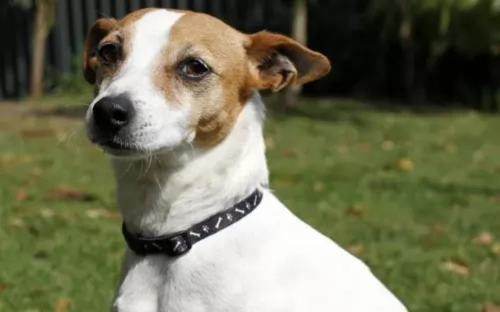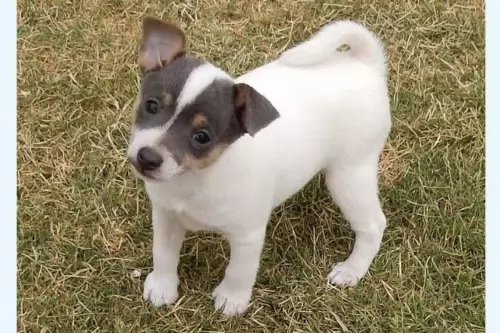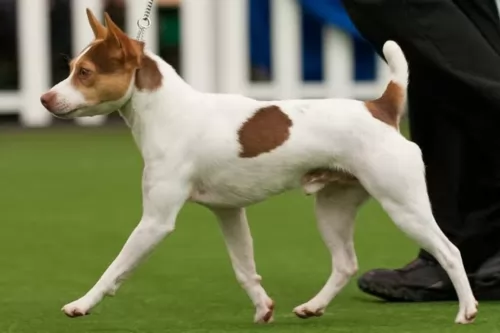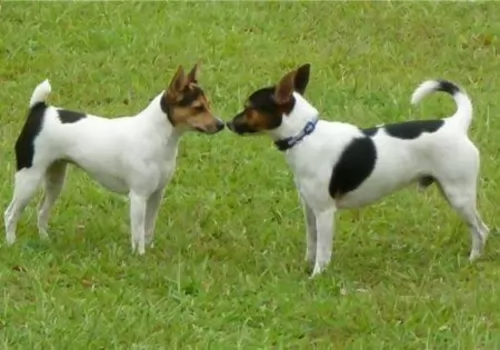 Petzlover
Petzlover Miniature Poodle is originated from Germany but Tenterfield Terrier is originated from Australia. Miniature Poodle may grow 7 cm / 3 inches higher than Tenterfield Terrier. Miniature Poodle may weigh 22 kg / 48 pounds lesser than Tenterfield Terrier. Both Miniature Poodle and Tenterfield Terrier has almost same life span. Both Miniature Poodle and Tenterfield Terrier has same litter size. Miniature Poodle requires Moderate Maintenance. But Tenterfield Terrier requires Low Maintenance
Miniature Poodle is originated from Germany but Tenterfield Terrier is originated from Australia. Miniature Poodle may grow 7 cm / 3 inches higher than Tenterfield Terrier. Miniature Poodle may weigh 22 kg / 48 pounds lesser than Tenterfield Terrier. Both Miniature Poodle and Tenterfield Terrier has almost same life span. Both Miniature Poodle and Tenterfield Terrier has same litter size. Miniature Poodle requires Moderate Maintenance. But Tenterfield Terrier requires Low Maintenance
 The Poodle is no stranger to the dog world and has been a familiar face in Western Europe for hundreds of years. Though they have lived in Europe for centuries, their origins are unsure, with some saying they hail from Germany and others say France.
The Poodle is no stranger to the dog world and has been a familiar face in Western Europe for hundreds of years. Though they have lived in Europe for centuries, their origins are unsure, with some saying they hail from Germany and others say France.
The Miniature Poodles have been used in both countries as gundogs for water birds.
They have always been admired for their intelligence, and Miniature Poodles are believed to have been bred from Standard Poodles. It is interesting to note the 3 official sizes of the Poodle are Toy, Miniature and Standard – all considered one breed and judged according to the same written standard, just with different size requirements.
 The ancestors of the Tenterfield Terrier came to Australia with the British and from them came this Australian breed. The English terriers were bred to be ratters on the ships to Australia. Today’s breed is a hardy, strong, athletic and agile dog. These first dogs were miniature Fox Terriers, bred for ratting. The miniature Fox Terrier was an established breed in the late 19th century in Australia with families and was know as a Mini Foxie. The breed became a steady presence in homes by the 1920’s.
The ancestors of the Tenterfield Terrier came to Australia with the British and from them came this Australian breed. The English terriers were bred to be ratters on the ships to Australia. Today’s breed is a hardy, strong, athletic and agile dog. These first dogs were miniature Fox Terriers, bred for ratting. The miniature Fox Terrier was an established breed in the late 19th century in Australia with families and was know as a Mini Foxie. The breed became a steady presence in homes by the 1920’s.
The breed might not have been named after the area of Tenterfield as many have guessed. Instead they may have been named after a breeder. The owner of the Tenterfield saddlery was called Tenterfield Saddler and he owned several of the breed. In 1990, Don Burke, a television personality suggested the breed be named the Tenterfield Terrier.
The Miniature Fox Terrier Club of South Australia. Now there were several clubs in Australia and a lot of disagreement about exactly what type of dog a miniature fox terrier was. Some did not think the name was legitimate, but they wanted recognition from the Australian National Kennel Club (ANKC). So, they became the Tenterfield Terrier Club of Australia in 1993. They were recognized by 2002.
Today the breed standard for the Tenterfield Terrier is different from the one for the Miniature Fox Terrier. They are now entirely separate breeds. In addition to the ANKC, the breed is recognized by the New Zealand Kennel Club but not by the AKC. It is also recognized by the American Pet Registry, Inc, the American Canine Registry and the Dog Registry of America, Inc.
 With good care the lifespan of the Miniature Poodle is 14 – 16 years of age. This purebreed dog is small, standing at 28 – 38cm in height and weighing 7 – 8kg.
With good care the lifespan of the Miniature Poodle is 14 – 16 years of age. This purebreed dog is small, standing at 28 – 38cm in height and weighing 7 – 8kg.
The coat is typically curly, springy and dense. Colors of the coat can be cream, beige, silver, black, brown or apricot. They are low shedding dogs and are regarded as being hypoallergenic. The ears are floppy and the tail is usually docked to give the dog a nice, compact look.
The Miniature Poodle is intelligent and learns easily, so you won’t have any trouble with training him and having him socialized.
He is a lively dog and loves a game and a walk, loving as much time as possible spent with his human family. He gets on well with other pets in the home as well as with children who have been taught to be kind and gentle with animals.
They are not overly-friendly with strangers, and therefore make excellent watchdogs. They’re the kind of dogs who need both physical and mental stimulation though, and he won’t be content to be left and ignored – after all he counts himself as a member of your family! They make wonderful pets, being playful and energetic and loving water, always ready to swim with you.
 The Tenterfield Terrier is square and compact. He has a head shaped like a wedge and unusual in the terrier group. They have pricked ears and are predominantly white mixed with tan or black. They could also be tri-colored in black/tan and white or tan/liver and white. They have naturally occurring bob tails or docked tails. The nose is usually black unless the dog is liver colored, they have liver noses. The jaws are strong, and lips are tight with a strong neck.
The Tenterfield Terrier is square and compact. He has a head shaped like a wedge and unusual in the terrier group. They have pricked ears and are predominantly white mixed with tan or black. They could also be tri-colored in black/tan and white or tan/liver and white. They have naturally occurring bob tails or docked tails. The nose is usually black unless the dog is liver colored, they have liver noses. The jaws are strong, and lips are tight with a strong neck.
 When you take a Miniature Poodle into your home and your heart, there are many wonderful positive aspects that come with him.
When you take a Miniature Poodle into your home and your heart, there are many wonderful positive aspects that come with him.
You won’t have any trouble training him as he is clever and bright. He is such a loving, loyal pet and he takes his job of guarding you seriously too.
Because they aren’t aggressive, they're easy to keep in the city or the countryside, so long as he receives plenty of love, companionship and exercise. Perhaps the only thing that may require a little bit of effort on your part is the fact that his coat will require quite a bit of upkeep to keep it looking good and healthy.
In exchange for looking after him, you’re going to benefit from having a wonderful canine friend and family pet in your life for many years.
 3.Adaptability – they need space even though they are small. They need a lot of exercise. They can adapt if they get another exercise. They can live in apartments and can play indoors as well as out.
3.Adaptability – they need space even though they are small. They need a lot of exercise. They can adapt if they get another exercise. They can live in apartments and can play indoors as well as out.
4.Learning ability – They are extremely intelligent, but they can be stubborn like all terriers.
 Dog’s thrive on good nutrition and exercise, and if your Miniature Poodle gets both of these combined with plenty of love, he can live to be up to 16 years of age and even older.
Dog’s thrive on good nutrition and exercise, and if your Miniature Poodle gets both of these combined with plenty of love, he can live to be up to 16 years of age and even older.
They are robust little dogs, but even so, they can get sick. Ear infections, joint diseases, obesity, dental disease and bloat are common dog diseases to look out for -
This is a life-threatening condition where your pet’s stomach fills with gas. The swollen stomach puts pressure on the diaphragm and the dog battles to breathe. The dog could also vomit, be drooling and lethargic.
The stomach can also twist putting the dog in shock. This bloating can occur with any dog breed and efforts can be made to avoid it by feeding the dog smaller more frequent meals as opposed to one larger meal which he gobbles up.
The dog shouldn’t exercise immediately after a meal either. You also want to avoid obesity at all costs.
When the mitral valve malfunctions, blood isn’t being pumped out of the heart to the rest of the body. If the mitral valve weakens or leaks it can lead to endocarditis.
Quite a number of dogs develop some form of heart disease during their lifetime, with a high percentage being due to mitral valve insufficiency, which is more common in smaller dogs.
Your dog may have a cough, be lethargic and lose weight. The first signs of a leaking mitral valve is a heart murmur. At first MVI doesn’t have obvious clinical signs, but with time the efficiency of the heart is reduced and congestive heart failure develops. Your veterinarian will evaluate your pet and suggest treatment.
A skin problem sounds fairly mild but it can cause havoc in your pet’s life, causing him to be constantly licking and scratching himself. The hair becomes dull and brittle, and breaking the skin from continuous scratching invites bacterial infection. These skin infections will require veterinary intervention.
 They are small in stature and because of their face they seem to have dental issues. The breed does not have a lot of health issues but deals with the same issues as many small terriers. Not all members of the breed are susceptible to these, but some are just like the Australian Terrier.
They are small in stature and because of their face they seem to have dental issues. The breed does not have a lot of health issues but deals with the same issues as many small terriers. Not all members of the breed are susceptible to these, but some are just like the Australian Terrier.
 If you opt to keep your Miniature Poodle’s coat long, it will actually require regular brushing – every day in fact, if you want to avoid matting and tangling. Most people don’t like the work this involves and they have their Poodle’s hair cut short all over, then he only needs a brush once or twice a week. Your Miniature Poodle just loves the time you spend with him grooming him. It’s your time to feel for any unusual lumps and to also check for fleas and ticks. Some people take their pet to the doggy parlor to have the coat clipped.
If you opt to keep your Miniature Poodle’s coat long, it will actually require regular brushing – every day in fact, if you want to avoid matting and tangling. Most people don’t like the work this involves and they have their Poodle’s hair cut short all over, then he only needs a brush once or twice a week. Your Miniature Poodle just loves the time you spend with him grooming him. It’s your time to feel for any unusual lumps and to also check for fleas and ticks. Some people take their pet to the doggy parlor to have the coat clipped.
The dog’s nails should also be trimmed regularly, and their ears also need to be checked for wax buildup and debris which can lead to an ear infection.
Teeth need to be checked over too because dental disease won’t only lead to loss of teeth but it could be toxic for important body organs too.
Wipe around your pet’s eyes as tear stains can form under the eyes.
Make sure to feed your pet a top quality diet full of vitamins and minerals. Get to know the foods which can be toxic for your pet and cause stomach upsets. Dogs appreciate simplicity and consistency with their diets, and apart from dry kibble, home-made food such as boiled chicken, brown rice and vegetables can be excellent for your pet.
 1.Feeding the puppy – Don’t overfeed but do feed high quality puppy food for small breeds and terriers.
1.Feeding the puppy – Don’t overfeed but do feed high quality puppy food for small breeds and terriers.
2.Feeding the adult – This is an active breed but don’t overfeed. Feed a high quality adult dog food for terriers or small breeds. Feed 2 times a day.
4. Games and Exercises – The breed has a high energy level and needs a lot of exercise. He is a terrier and loves to “go to ground”. Play activities that allow him to do that are best. He plays barn hunt, lure coursing and terrier specific competitions.